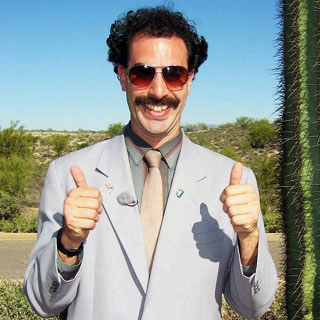
His name is Borat, he likes sex and he likes you. And you should like him right back.
Unless you have been living under a pop-culture rock for the past few weeks, you’ve already heard all the hype about Borat: Cultural Learnings of America for Make Benefit Glorious Nation of Kazakhstan. You’ve seen star Sacha Baron Cohen host the MTV Europe Awards, grace the cover of Entertainment Weekly and introduce this past week’s Saturday Night Live, in all his tall, hairy, mustachioed glory.
And if you have any sense, you’ll be one of the dozens of people lining up to see Borat tomorrow.
Sure, Cohen is offensive to anyone and everyone in this film (Jews, Gypsies, Uzbekis and women are his favorite targets). Granted, Borat Sagdiyev, the Kazakh journalist, does have some awkward hobbies (ping pong in obscenely short shorts, sunbathing in a neon green bathing suit straight out of Showgirls and “watching ladies while they make toilet”), but he’s also hilarious during every moment of this 82-minute film, mocking everything about American culture while on a quest to learn more about our nation.
The film starts in Kazakhstan, where Borat is a television reporter who makes out with his sister, the fourth-best prostitute in all the land, and complains about his “pain in my assholes” neighbor. He loves his country but sees Kazakhstan as a nation suffering from “economic, social and Jew” problems and decides to visit the United States to learn how to better his small state.
It’s in the United States where Borat’s real fun begins, as he and his producer Azamat (Ken Davitian, S.W.A.T.) arrive at JFK Airport in New York City and promptly introduce themselves to random people on the street, some who run in fear and others who react less than kindly (“My name is mind your own f—ing business,” says one man). Things only get more awkwardly ridiculous when Borat’s suitcase opens on the subway (a live chicken falls out, a running joke through the film), he washes his face in a hotel toilet, defecates in public shrubbery and masturbates in front of a Victoria’s Secret store as hundreds of people walk by.
But after Borat watches a mid-1990s episode of Baywatch starring the blonde, busty, PETA-loving Pamela Anderson, he decides to abandon his quest to learn more about America and switches to learning more about Anderson – or kidnapping and marrying her, whichever – instead. Although he first worries he can’t be with CJ, Anderson’s lifeguard character, because of his wife (“I could not pursue her. Otherwise my wife would snap off my cock.”), Borat throws all caution to the wind after he learns his wife is dead – and high-fives the man that brings him the message.
So begins a trek across the country to California because, “for the first time in my life, I was in love,” Borat says. He opts out of flying “in case the Jews repeat their attack of 9/11,” instead choosing to rent an ice cream truck once he learns he doesn’t have enough money for a Hummer.
Some of the best scenes in the film occur during this road trip, from when Borat visits a women’s rights group that abandons the meeting after he says women have smaller brains than men, to when he sees a woman holding a yard sale and, upon seeing a Barbie doll, asks the woman, “Who is this lady you have shrunk? Do not try shrink me, gypsy.” Instead of buying the doll, Borat buys a poster-book about Baywatch, bringing him one step closer to the CJ of his dreams.
But what makes Borat work so well is the dichotomy of scripted and unscripted, scenes where Cohen employed actors to play out his ridiculous roles juxtaposed with real events with real people. The audience never knows which is which: Did Cohen actually get drunk with college students and watch the Pamela and Tommy Lee porn with them? Were the hotel employees in Atlanta who Borat calls “vanilla-face” real workers or actors?
The most reality-questioning scene in the film is when Borat attends a rodeo and has a conversation with an older cowboy-type with a thick Southern accent and an American-flag-emblazoned shirt. With no prompting from Cohen, the man orders him to shave his mustache because it makes him look like a Muslim (and automatically a terrorist), and then laughs about how when he first saw Borat, he thought, “Goddamn, where the bombs he’s got?” It doesn’t help that the man then says that hanging homosexuals is “what we’re trying to get done here” in America.
Sure, the scene gets hilarious when Borat tells the rodeo crowd that Kazakhstan supports America’s “war of terror” (“May George Bush drink the blood of every man, woman and child of Iraq!” he cries, as rodeo-goers cheer) but the audience is still left to wonder what Cohen is trying to say about the nature of American society, conservatism and nationalism. In a highly offensive film where Cohen attacks everyone, this obvious example of social satire (that Cohen doesn’t invite) sticks out like a sore thumb.
And yes, the film is highly offensive. Borat calls nearly all women prostitutes, jokes about rape and – of course – makes fun of Jews. Only five minutes into the film, Borat has already commentated an event called the “Running of the Jew,” where Kazakhs wave money at a man dressed as a giant puppet (“The Jew almost got the money that time!”) and attack a female puppet dressed as a “mother Jew” who lays a “Jew egg” (“Quick, children! Kill the Jew chick before it hatches!”)
Yes, Cohen is actually Jewish in real life (and British, at that), a fact that adds to the film’s irony and shows how far Cohen can take this character, this shtick and this film. It is that anything-goes mentality that makes the film’s conclusion so over-the-top, unbelievable and uproarious, as Borat tries to figure out a way to let Anderson “allow my entry into her vagin.”
So if you don’t see Borat tomorrow, shame on you; he will be “execute” by the Kazakh government, or so Cohen warns. Put aside your political correctness, cough up your $8 and go get some cultural learning. There’s more of it in Borat than you might think.
Contact reporter Roxana Hadadi at
roxanadbk@gmail.com.



